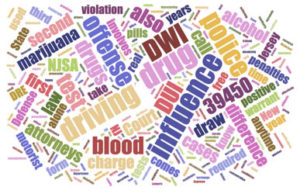Driving Under The Influence Of Drugs
A variety of N.J.S.A. 39:4-50 offense that is becoming more and more popular to file is driving under the influence of drugs. This charge is also often referred to as DUI and can result from any form of controlled dangerous substance including marijuana, heroin, prescription pain medication and sleeping pills like Ambien. If you were arrested by the New Jersey State Police on the Garden State Parkway or by a member of the Middletown Police Department on a local roadway for a drug DWI, our Neptune Office is ready to help you. Call us anytime for a free consultation.

What Is The Difference Between A Drug & Alcohol DWI?
The offense of driving under the influence of drugs, DUI or whichever other label you put on it, is set forth at N.J.S.A. 39:4-50. This is the very same statute that applies to an alcohol based DWI in Middletown. In this sense, an alcohol and drug violation under 39:4-50 are virtually identical. The real difference involves the proof needed by the police and prosecutor to prove a violation as a breathalyzer is worthless when it comes to detection for marijuana, hydrocodone or another drug. The common form of scientific test used in drug dwi cases is a urine or blood test, and one of these is absolutely required in the vast majority of driving under the influence cases. There also typically needs to be linkage between a positive drug test and failed drug recognition testing.
Can Police Force You To Provide A Blood Test?
No. The police are now required by law to obtain a warrant in order to draw blood other than under very narrow circumstances. This requirement, which was lacking prior to a recent United States Supreme Court decision, further complicates dui cases from the perspective of law enforcement. They must call a judge, reach him/her, and substantiate facts to support probable cause or a warrant to draw blood in Middletown or anywhere else in New Jersey. Our attorneys know how to effectively attack the affidavits and statements used by police to obta blood draw warrants.
How Are Drug Recognition Tests Administered?
As previously stated, a positive drug test alone will not establish driving under the influence alone. There is also a requirement that the accused fail standardized field tests designed to detect impairment from drugs that are administered by a specially trained police officer known as a drug recognition expert (“DRE”). The only time a DRE is unnecessary is where the offense involves impairment from marijuana.
What Are The Penalties For Driving Under The Influence?
The penalties for DWI and DUI are the same. The only real difference is for first offenses as there is no first and second tier. A first offense carries a 7-12 suspension. If you are convicted of this charge a second time, the driver’s license suspension escalates to 2 years. For third or subsequent offenses, the suspension is 10 years. There is also a mandatory county jail term of 2-90 for a second offense and 180 days for a third offense. Fines and court assessments are likewise stiff with a motorist usually facing in excess of $8,000 in terms of financial consequences between the fine, 3 year DWI surcharge of $1,000-$1,500 per year and skyrocketing insurance rates.
Middletown NJ Driving Under The Influence Attorneys
When it comes to defending N.J.S.A. 39:4-50 violations, there is no substitute for experience. Do your research and identify the attorney(s) with the best qualifications for achieving the outcome you need to your driving under the influence charge. Be careful to take a close look to know exactly how long the lawyer has been practicing, whether he really has a concentration of experience in DWI and DUI defense, and his/her bona fide familiarity with the Middletown Municipal Court. If you employ this criteria, as you should, we are confident that we will be among the extremely small group of law firms that you consider viable candidates. Our Middletown NJ Defense Lawyers would be happy to speak to you in a free initial consultation. Give us a call anytime 24/7.


